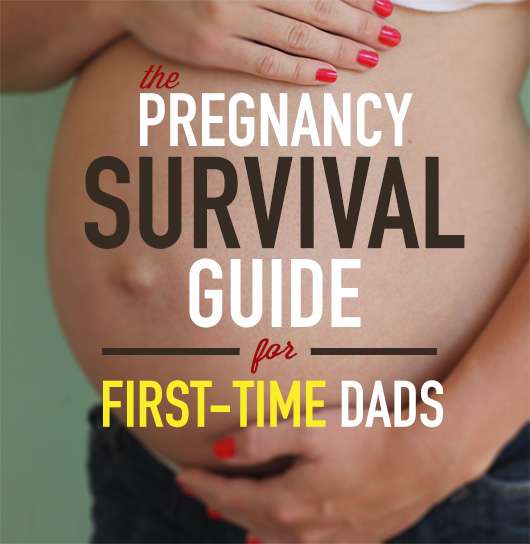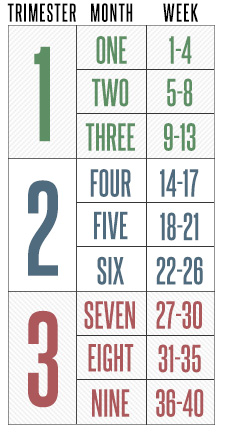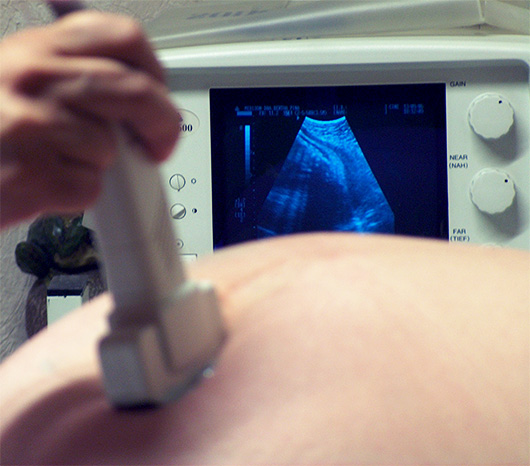You're having a baby? Congratulations! Are you freaking out? How long have you been trying? You were trying, right? When are you going to tell people? Do you know if it's a boy or girl? Where are you registered? Have you gotten the nursery ready yet?
Even if becoming a dad only meant answering these kinds of questions–which everyone in your life is bound to ask–pregnancy would be exhausting. Regardless, there's a lot more to it than that. Pregnancy is a complicated issue from day one, and it becomes even more challenging as it goes on. First-time fathers have a lot to learn, especially if they haven't spent much time around pregnant women.
My wife and I just had our first child, so I thought I'd offer a heads-up on what to expect during those important nine months. For the purposes of this article, I'm going to assume that you are in a relationship with the mother-to-be and you plan to help out as much possible with the pregnancy and everything that comes after.
The Stick Says “Pregnant”
When you first find out a baby is on the way, it can be hard to wrap your mind around what's in store. You know a major change is coming, but the only proof you have is a stick that says “Pregnant” or “+” or some arcane, ambiguous symbol that the instructions insist means she's pregnant. Just know that those sticks are almost never wrong, and your partner's OB/GYN will do a blood test to confirm the pregnancy at her first appointment.
The first thing you need to know is that pregnancy isn't fun. Compared to women, guys have it incredibly easy. It's not even a contest. She's the one who will suffer random bouts of nausea, who will have to pee nonstop, who will bloat and gain weight, who will feel ligament pain, and who will get stretch marks that never go away. She's also the one who will push a very large thing through a very small opening, or undergo a major surgery to get the baby out of her. Pregnancy is not a time for men to focus on their own comfort in the relationship.
That's not to say it won't be an emotional, stressful time for you, or that your feelings are invalid. You may go through an array of reactions to the situation, especially if this pregnancy wasn't in your plans to begin with. And that's perfectly normal. But if at all possible, don’t vent your negative thoughts and feelings to your partner. You can and should share your excitement with her, but save the negativity for someone else.
//
//pagead2.googlesyndication.com/pagead/show_ads.js
What You Can Do
Going into it, I thought nine months was nothing. I thought the pregnancy would fly on by and I'd be holding my child before I knew it. I was wrong. When you're waiting for a major life event, and your partner is going through a host of changes right in front of you, nine months feels like forever.
Your role is one of support. The best thing you can do for the mother of your child during this time is to be there for her. Bring her things so she doesn't need to get up. Rub her feet. Dote on her. She's going to be increasingly uncomfortable as the months tick by, and she'll appreciate all the help you can give.
Go to as many OB/GYN appointments as you possibly can. Your partner is going to have lots of doctor appointments over the course of the pregnancy. They're scattered around at first, with regular checkups and a couple of ultrasounds. By the third trimester, these visits become more frequent (and more intrusive for the woman).
As the male part of the pregnancy equation, you're not required to attend these appointments, but you should go to all of the ones you can. Lots of information is transmitted at these things, and it helps to have an extra set of ears. Since you won't be the one on the table getting your body poked and prodded, you should take notes on what the doctor says.
Always keep a notebook handy. You and your partner will probably come up with questions for the doctor almost every day throughout her pregnancy. Each time you think of a new question, jot it down in a notebook or note-taking app on your phone. Also track items of possible concern, like spotting, discharge, and pain so you can refer to them later if necessary. If your partner feels uncomfortable telling you about every intimate detail of her body, let her keep track of those notes, but encourage her to do so.
It's also smart to keep a list of baby names that you and your partner want to consider. Every time either of you comes up with a new one, write it down if you both agree it's in the running.
The First Trimester
The first trimester is uncomfortable for the woman. Her body is flooded with new hormones to prepare for what's coming, and every woman’s body reacts differently. She will probably experience morning sickness, which despite its name can come on at any time of day. She may also have strange food cravings, feel fatigued, and have to go to the bathroom all the time. Her sex drive may go way up or way down. And since she's not visibly pregnant yet, strangers won't give her any preferential treatment.
What you should do now is gather information. Check books out of the library and read them. Bookmark quality online resources like MayoClinic, WebMD, and BabyCenter. I found BabyCenter's weekly email very helpful, because it tells you what's going on with your child's development and what challenges you and your partner can expect to encounter at each point during the pregnancy.
The Second Trimester
The second trimester is usually a little easier than the first. Morning sickness starts to wane at this time, and although her belly is growing, the baby isn't big and cumbersome yet. Still, it's normal for her to become fatigued easily and experience shortness of breath.
You need to keep talking to her to find out how she's doing, what she needs, and what you can do to make it easier for her. You should also put together a baby shower registry, preferably with help from a friend or relative who’s recently had a baby. Websites like Babies ‘R Us and BabyCenter also have registry checklists you can use as a guideline.
Now is also a good time to take birthing and newborn care classes. These classes, usually available at hospitals or other medical facilities, provide you with great information about the process of childbirth and the basics of caring for newborns. They'll give you booklets of information, but it's also wise to take notes.
It's also time to schedule some pediatrician interviews. Talk to friends and colleagues for recommendations, and see who's in your insurance network. Then interview at least three doctors before picking the one you want to use. You can find a good list of questions to ask here.
The Third Trimester
The baby is big now. By the time your partner enters the third trimester, she won't be able to imagine how she could get any bigger. She also may experience the occasional Braxton Hicks contraction, which are like miniature versions of the real thing. By week 37 the baby is considered “full term,” which means labor could begin at any time.
At eight months, your partner should have her baby shower. This is by far the best way to stock up on baby gear, because it's way cheaper to send a stack of thank you notes than to shell out cash for all the expensive stuff you're going to need. And you’ll need a lot of stuff, from a crib and bassinet to clothes and car seats. It adds up fast.
There's a trend now for baby showers to be co-ed events, with both her friends and yours invited to the festivities. This is a great idea in theory, but if your buddies are like mine, they’d rather change a dirty diaper than attend a baby shower. Enter the “diaper party.” This increasingly popular event is basically just an excuse for you and your buddies to get together, drink beer, and scarf down junk food. The only difference is that everyone brings you a box of diapers. A diaper party is like the best of both worlds: it's much more fun for guys than a co-ed baby shower, and it gives you a big stash of diapers for your newborn to defile.
Labor
Do you think you're ready for labor? You are not ready for labor. Labor is intense and terrifying. It's painful. The buildup takes hours, and then everything seems to happen at once. It's grotesque, like something from a horror movie, but it’s heartbreaking because there's nothing you can do to alleviate the pain. It can also be weirdly enchanting. You might not want to look, but you might not be able to look away. If you're worried about it, you can watch YouTube videos to get an idea of what to expect.
When it's all over, take some time to be with your new family. Try to let it all sink in. You're about to embark on an entirely new adventure. And get some sleep. You'll need it.



















